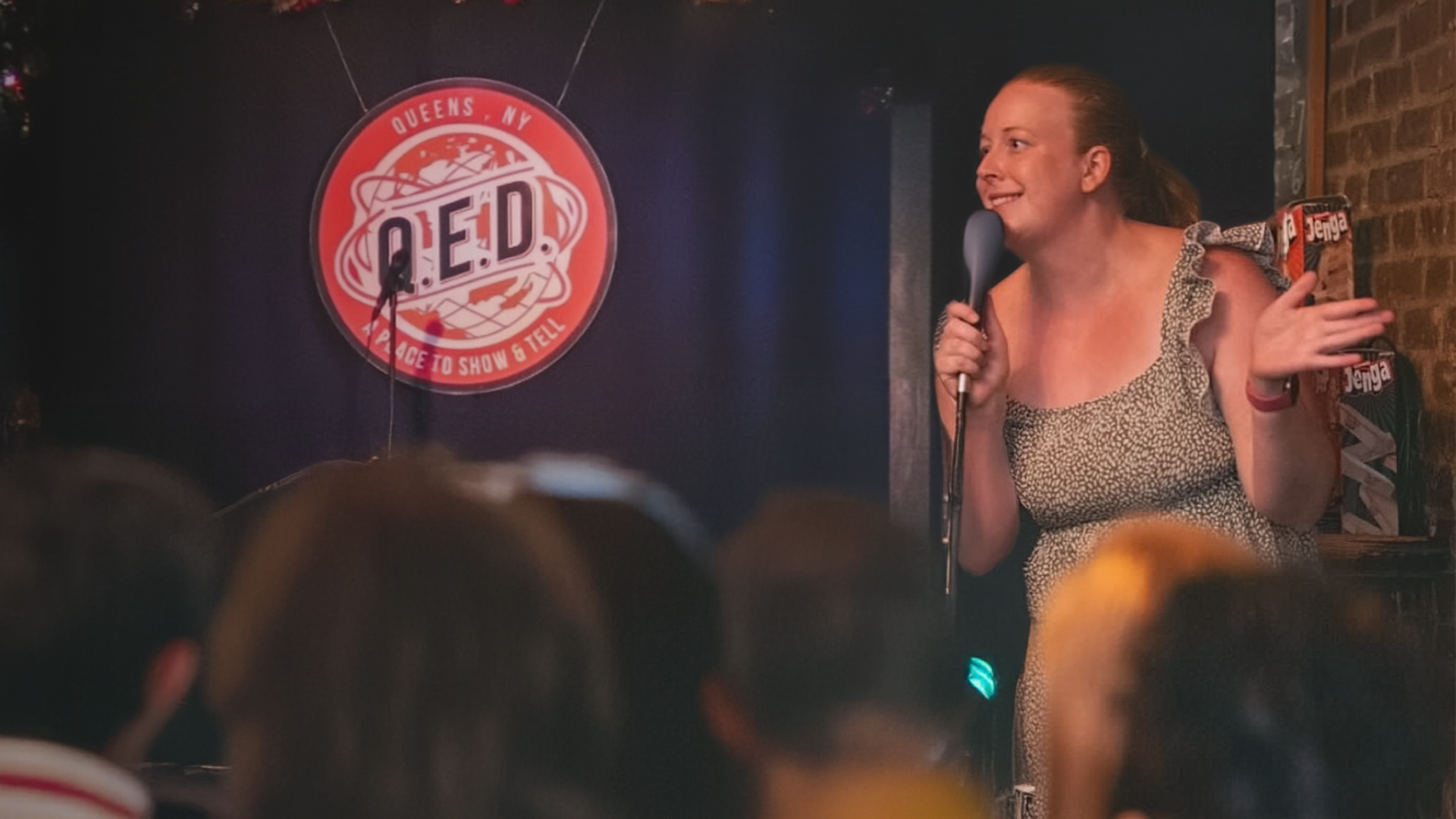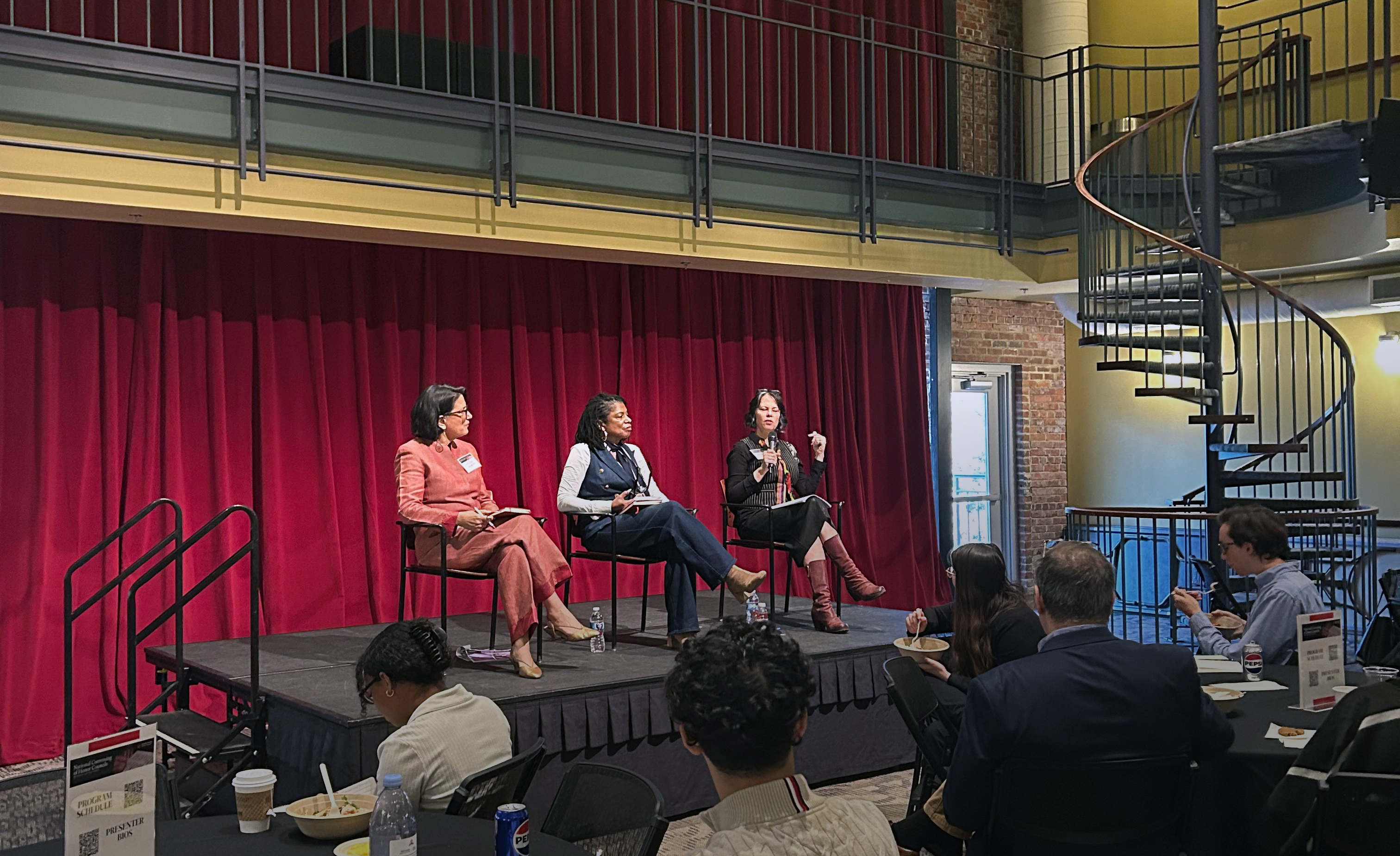Innovation in Action: The Jay Hurt Hub Celebrates Fifth Anniversary
May 17, 2023
- Authors
- Caroline Roy '20
At the Jay Hurt Hub for Innovation & Entrepreneurship, aspiring entrepreneurs find mentors and paths for their ideas to become reality.
Fans of the hit television show “Shark Tank” enjoy a brief, weekly glimpse into the drive required to create something new–to believe in it, to research it, to pitch it, to run it. And, to recognize when it isn’t working.
Investment hopefuls walk onto the set, lovingly called The Tank, where they are met with tough questions and criticism from potential partners, The Sharks. They also get advice, like “There are no nos, just ‘how can I?’” from Lori Greiner, the “Queen of QVC,” who has hundreds of inventions and holds 120 patents.
Would-be Davidson entrepreneurs don’t have to get their advice from television. Through the Jay Hurt Hub for Innovation & Entrepreneurship, students can gain the confidence and know-how to turn their ideas into services and products. The college doesn’t have a business major or graduate school, but it does prepare students to lead, serve and effect change … and to make money doing it.
Next month marks five years since a historic cotton mill in Davidson was transformed into a sky’s-the-limit incubator for innovation and entrepreneurship for the campus and the region. The 23,000-square-foot space has become a second home to students, faculty, co-workers, mentors, alums and investors looking to inspire innovation and bring business ideas to life.
The latest stats shared by Liz Smith Brigham ’04, the W. Spencer Mitchem '59 Director of Innovation & Entrepreneurship, boasted numbers only dreamed of half a decade ago. Last fiscal year alone, students spent more than 3,400 hours consulting with businesses, and they were awarded nearly $100,000 in start-up capital. The Hurt Hub@Davidson counted more than 150 co-workers as part of its community and engaged 120,000-plus learners through classes delivered via the Davidson EdX platform. And, alums, families and partners invested nearly $5 million through private philanthropy to move its mission forward.
These are the stats, but the people tell the stories.
Brie Burrell '23
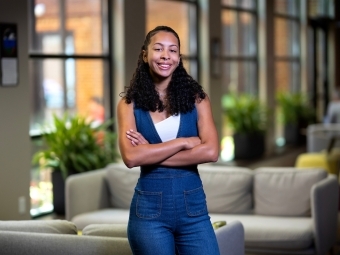
Brie Burrell '23
If Hurt Hub opportunities filled a Bingo card, Brie Burrell ’23 would be the “cover-all” winner. She first walked through the doors as a first-year student and never left.
“I first applied to be a Gig-Hub Consultant and worked on graphic design projects for Elite Roofing,” she says. “The logo I created ended up on the side of a vehicle, so that was really cool. I’ve always liked art, but I wasn’t sure how I could turn that interest into a career. The Hurt Hub has helped me figure that out.”
Inspired by that first Gig-Hub experience, the psychology major and studio art minor completed several more “gigs,” ranging from branding projects to coloring books, and she enrolled in a design-focused study away experience in Copenhagen, Denmark.
Burrell was building quite the portfolio and applied for the Hurt Hub’s Try It Fund, which awards money for students to do exactly what the name implies—try something. She used part of the fund to build an online portfolio.
“This was actually my second Try It Fund,” she says. “The first was an attempt to start a business selling satin-lined hoodies, and the manufacturing piece was a nightmare. But, I tried it!”
Burrell’s Hurt Hub connections have led to some life-changing experiences. Davidson’s inaugural Innovator-in-Residence, Mbye Njie ’04, helped her land a summer internship with Lippe Taylor, an agency in New York City. They extended her employment after the summer, and she continued to work with them for several months.
Burrell also had the opportunity to attend a South by Southwest (SXSW) conference, an opportunity born out of the partnership between the Hurt Hub and the college’s Betty and B. Frank Matthews II ’49 Center for Career Development.
“It was amazing,” she says. “I met art directors, agency reps, and I’ve been doing a ton of Zoom calls since then, growing my network. It’s really helped me build my freelance business, too.”
Looking ahead, Burrell is excited to turn her experiences into a career, and she credits Davidson and the Hurt Hub with helping shift her mindset around what’s possible.
“Being an artist means being an entrepreneur, and I’ve learned how to dismiss the struggling artist mentality,” she says. “Liz [Brigham] and all the opportunities I’ve had helped me connect the dots.”
Constantine Desjardins ’24 & David Hilton ’24
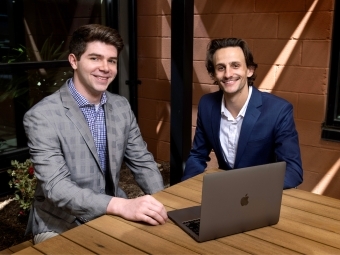
Constantine Desjardins ’24 & David Hilton ’24
Constantine Desjardins ’24 spent many summers as a camper and counselor at Camp Lawrence in Bear Island, New Hampshire. Now, he and his business partner, David Hilton ’24, are supporting future camper experiences through Direct Camp, a software algorithm that helps summer camps stay organized during the busy summer season and turns campers’ activity preferences into daily schedules.
Desjardins, a Try It Fund grant recipient and Avinger Impact Fund winner has always wanted to create and run his own business. He’s the president of Davidson’s Entrepreneurship Club, which he helped bring back to campus last year, and he’s worked with the Hurt Hub by participating in a start-up course and pitching an idea at start-up weekend.
Direct Camp started with identifying a problem: Camp Lawrence needed a faster and easier way to keep track of scheduling. Partnering with his sophomore roommate, who developed the algorithm behind Direct Camp, Desjardins and Hilton set out to solve that problem.
“I got the advice to start by thinking about my interests,” Desjardins says. “[Scheduling] was one of the biggest problems we encountered when I worked at my camp. We had a customer who was interested in our solution, and that was enough to get started.”
For the past year, the friends and classmates have continued to work with Camp Lawrence while expanding what Direct Camp can do. In the future, they want to help camps organize payments, support their medical needs and hire international staff. Eventually, they think the process could be fully automated, but in the meantime, they’ll continue to build one-on-one relationships with existing clients.
“The more we work with a camp,”says Hilton, “the more they trust us and trust our service.”
Building trust with one client has led them to others, too. Through word of mouth, the team has connected with other potential summer camp clients, one of which they’ll be taking on this summer.
As Direct Camp’s network grows, Desjardins and Hilton have each found a renewed interest in entrepreneurship through the support of the Hurt Hub.
“This project has shown me that I can impact individual lives through technology,” says Hilton. “Anyone can try something like this. We have great resources and support–people want to see you succeed.”
Desjardins says he’s grateful for the opportunity to try something like Direct Camp without fear of failure.
“One of my personal goals is to make sure Camp Lawrence never has to struggle with scheduling again,” he says. “For students who are interested in something like this, my advice is to be mindful of your personal interests and experiences. Identify those really frustrating problems. That’s where you’re most likely to have success.”
Chloe Boissy Stauffer ’24
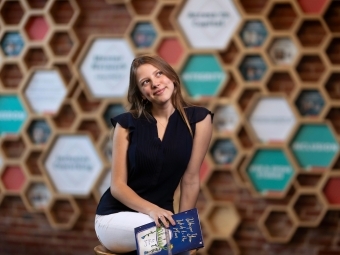
Chloe Boissy Stauffer ’24
Chloe Boissy Stauffer ’24 dreamed up the concept for a children’s book that reflects her passion for the natural world and led to her writing, illustrating and self-publishing Whisper Your Wish to the Moon, a story inspired by the colors and imagery of her home near Lake Atitlán in Guatemala.
The political science and environmental studies double major attended The Waldorf School in Guatemala, which she says helped foster her love of storytelling and art. The idea to create a book first came to her in a bookbinding class at Davidson—through resources at the Hurt Hub, she’s been able to bring the book to life.
“The concept stuck with me, and I just kept building on it,” she says.
The book tells the story of a young girl delivering her wishes to the moon, each page full of depictions of nature and magic.
“I like the idea of reconnecting with mythical concepts,” says Boissy Stauffer, “like having the moon and the wind as characters.”
With the story and design complete, she published and printed the first 50 copies through Kindle Direct Publishing. Some of these, she says, will go out to the important people in her life—family, friends and professors. Copies are also available for purchase on Amazon.
Eventually, the book will be available online, too. Boissy Stauffer plans to create a digital platform where she and others can make their creative projects accessible to a larger audience. Still, she feels publishing print copies is an essential part of telling this story.
“The story takes place in a world without technology,” she says. “Kids are surrounded by so much technology every day, so publishing this story on paper was important to me.”
Boissy Stauffer plans to pursue a career in environmental policy or immigration law after graduation next year. Her plans for her time at Davidson didn’t always include writing a book, though her passion for studying the environment shines through on every page. The Try It Fund, she says, has allowed her to explore her creative outlets outside of academics. The process of publishing a book, from the first idea in bookbinding class, to the hours spent on art and design, to the final, published draft, hasn’t been simple.
“I’m proud of myself for sticking with it,” she says. “It’s so nice to have the support to do these kinds of projects on campus.”
Update: Boissy Stauffer won the Incubation Track prize at the 2023 Nisbet Venture Fund Pitch Competition for Modern Myths, a personalized brand that designs unique and whimsical children’s books, toys and accessories.
Malobi Achike
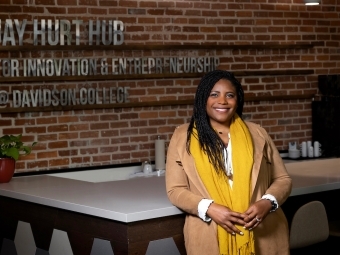
Malobi Achike
At the start of the COVID pandemic, Malobi Achike walked the tightrope between her demanding corporate job and balancing schedules with her spouse to meet the needs of their two young children.
She began to ask a big question: how to change direction … and to what.
“I wanted to find work more connected to my passion so I could make the kind of impact I wanted to make,” she says. “The ‘ah-ha’ moment struck soon after George Floyd’s murder, when individuals and companies participated in the ‘Blackout Tuesday’ effort on social media. I looked at that action and thought it wasn’t enough. It didn’t come close to being enough. And I knew I could help.”
That day, the seed was planted for DEI Directive, which grew from an idea to a fully incorporated company in 2021.
“It was a rollercoaster start,” Achike says. “It has taken a lot of time and a lot of confidence building, reminding myself that what we’re doing is really needed.”
The mission of the organization is to provide a platform with real-time data that offers deep insights to guide decision-making around diversity, equity and inclusion. It allows human resources professionals to drive, track and manage the organization’s DEI health in a way that yields sustainable results.
“We study the U.S. workforce, and we’ve learned that employees are highly disengaged, and key topics at any HR-related meeting include attracting and keeping good talent,” Achike says. “Our software helps with that.”
Achike and her co-founder first learned about the Hurt Hub during a start-up program in Charlotte, and they followed up to find ways to tap in. The partnership helped them get their business going, and now DEI Directive employs two current students; one is the marketing manager and the other works on business development. One student came to them through the Gig-Hub program and the other through the NEXT Level initiative, a new cohort-focused program for first-generation Davidson sophomore students designed in partnership between Gig-Hub and the Matthews Center for Career Development.
“These students do amazing work for us, and we’re able to give back to them through mentoring and helping them develop within the workplace,” Achike says. “They bring to their roles curiosity and an excellent work ethic. They set the bar high for themselves and for our work together.”
Achike calls the Hurt Hub “a great resource in the entrepreneurship ecosystem,” a place full of wonderful and supportive people eager to understand current challenges and point each other in the right direction.
“Early on, as we were putting this together, Liz [Brigham] and the team created space for us to test things out in a safe space and get real feedback,” she says. “It’s invaluable.”
Mike Faubert
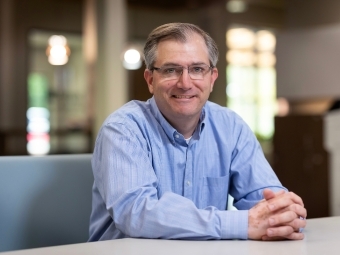
Mike Faubert
Spend five minutes with Mike Faubert, and he’ll convince you to buy his latest invention and inspire you to create something, too. The president of Store Solutions lives in Davidson and has created and sold products ranging from handles that simplify the transport of heavy bags of mulch or dog food to plastic caddies that store everyday essentials by the front door.
Faubert found a natural fit in the Hurt Hub.
“I first was involved with LaunchLKN—now LaunchCLT—and that led me to the Hurt Hub,” he says. “I’ve hired students, taught classes and mentored on a smaller scale through [Theatre Professor] Steve Kaliski’s classes, where he’s working with students on how to present themselves and speak in public.”
Faubert taught the Hurt Hub’s first Co-starters program, a 10-week class that walks participants through the steps of starting and operating a business. His students ranged from current Davidson students to grandparents.
“The outcome of the class can be very different for each person,” he explains. “Someone might leave the class inspired to keep moving forward with their latest idea. Someone else might realize they need to ditch the current idea and consider something else. Both are successful results. Knowing what isn’t working is just as important as knowing what is.”
Faubert isn’t afraid to ask questions and consider how he can make something better, and his experience helps students and business leaders do the same. He focuses specifically on products that have been around a very long time and asks whether it’s time for a change. Case in point: the door lock.
“Did you know a door lock has 89 different pieces in it?,” he asks. “Eighty nine. Why do we open doors this way? That’s the kind of conversation constantly going on in my head.”
That’s also exactly how one of his inventions came to be.
Faubert loves to talk innovation every chance he gets, but he also loves that he can connect with students in a meaningful way, one mile from his home. Students have easy access to people eager to help them, and residents of the region have an opportunity to be involved with the college.
“I’m naturally a people person, and I work from home,” he says. “So basically, if I can talk to someone about something I’m an expert in and they’re interested, I’m there. Sign me up.”
Rebecca Weeks Watson
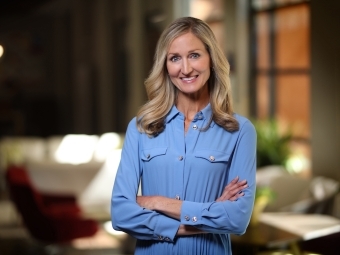
Rebecca Weeks Watson
When Rebecca Weeks Watson moved to Charlotte from Silicon Valley, she was searching for the best ways to plug into her new community and find an engaging network of entrepreneurs. Her father, K.D. Weeks ’69, sent her right up the road to Davidson.
“I was used to seeing strong innovation and entrepreneurship offerings at large universities with heavy engineering and tech programs, like Stanford and Berkeley,” she says, “so I was honestly surprised to find such a rich community at the Hurt Hub. I immediately fell in love with the space and the vision.”
That love quickly led to involvement, and Davidson has benefited from Watson’s vast experience building start-ups and advising others on their best way forward. With her additional experience lecturing at her alma mater, the University of Virginia, Watson was the perfect choice to teach courses at the Hurt Hub. A generous gift from Charlie Hinnant ’72 has helped make mentorship and instruction like Rebecca’s possible.
“The idea was born to offer a course for students and community members together, and I thought that was really clever,” she says. “I was thrilled to teach the first ‘lean start-up’ course based on the methodology of Eric Ries. Basically, he flipped the old-school way of starting a business, which was to make plans and start creating based on assumptions and then hopefully find customers who wanted it. The lean start-up approach puts customers and their problems at the forefront, so now you’re creating something customers actually need. It’s a novel way to build a business, and it’s saving entrepreneurs lots of time and money.”
Watson’s teaching was the “in,” and her reach now extends far beyond the classroom. She was a coach for this year’s Nisbet Venture Fund Pitch Competition and loves to work one-on-one with students seeking advice and mentorship.
“I jump at any chance to have a call or meeting with students,” she says. “Sometimes they’ve hit a hiccup and need some help or they’re stuck on which direction to take an idea. I love to see that entrepreneurial spirit come through and follow along to see where their work takes them. That’s what gets me really excited.”
As a business owner, Watson understands the batting average for entrepreneurs is low, so it’s important to encourage students to try many different things and to try them often. Her message is one that applies to founders in their new venture pursuits as well as students in their personal lives: Experimentation feels better and leads to more successful outcomes the more you do it.
“Part of the innovator’s mindset is getting over potential failure or embarrassment,” says Watson. “It’s important to remain curious and explore a number of creative solutions. The Hurt Hub does such a great job of creating space for those things. I’m really proud to be a part of it.”
This article was originally published in the Spring/Summer 2023 print issue of the Davidson Journal Magazine; for more, please see the Davidson Journal section of our website.

